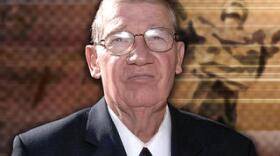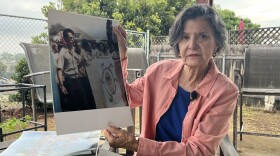MICHEL MARTIN, Host:
I'm Michel Martin and this is TELL ME MORE from NPR News.
Coming up, grace notes from uniquely American musical styles - Jazz and traditional music from the nation's largest Powwow, "The Gathering Of Nation's." But first, we talk more about torture. President Obama again denounced torture during his press conference last night. But his statements on interrogation have revived key questions on the torture debate.
Just, how far should the U.S. government have gone while interrogating terrorist suspects after 9/11? And how far should they be allowed to go in the future? Recently the classified memos lay out Bush administration's support of harsh interrogation techniques, which many people consider torture, and how often they were used and on whom? And those revelations have sparked even more questions - moral, ethical and political. Should someone be held accountable for the decision to use these techniques and if so, who and by whom? We've begun a series of discussions about these questions.
Last week we had a conversation with a member of the American Bar Association's Task Force on the treatment of enemy combatants. Today we'll hear a very different perspective from Michael Scheuer. He is the former head of the CIA's Bin Laden tracking unit. In the recent opinion piece in the Washington Post, Mr. Scheuer argued that the Obama administration's condemnation of torture is narrow, unproductive and ideologically driven, in fact, exactly as he describes President Bush's initiatives in the Middle East. Scheuer has a reputation for independent and critical analysis of both political parties on matters of intelligence and national security.
And he has a reputation for expressing those views in a provocative fashion, so be forewarned. We caught with him earlier this week and I asked him - whether he had personal knowledge of the kinds of techniques at issue? Whether he had ever participated in them or ever witnessed them himself?
MICHAEL SCHEUER: Yes, of course yes.
MARTIN: Is it your view, based on your experience, that these techniques are effective in...
SCHEUER: Absolutely yes.
MARTIN: You believe that they are?
SCHEUER: Yes.
MARTIN: Okay. So, let's - so let's walk through your recent op-ed. You criticized both President Obama and former President Bush for letting ideology guide their approach to these issues. Tell me why?
SCHEUER: Well, President Bush got us into the war in Iraq and in other difficulties in the Muslim world because he believed, somehow, from his personal view, that everyone in the world is dying to have a democracy that looks like ours. And of course in the Muslim world, to take a secular democracy is to turn your back on God. And so the president's ideology very much did drive our foreign policy for eight years and much to our detriment. And for President Obama, as I understand what he said, we'll never use these techniques again. I think he said that very clearly. Now the techniques - the interrogation techniques clearly produced information that has benefited the defense of Americans, their homes and their families.
So, one can only assume, by the president saying they'll never be used again, that his ideology, at least he thinks his ideology is more important than protecting the Americans through the use of these interrogation techniques.
MARTIN: You say in our op-ed, and just a look for something when I read it for themselves, we'll have a link on our Web site. You say and I quote Bush's world view produced an enemy that quickly outpaced the limited but proven threat- containing capacities of the major U.S. counterterrorism programs: rendition, interrogation and unmanned aerial vehicle attacks. Now, in a single week, President Obama has eliminated two-thirds of that successful but not sufficient national defense troika, because his personal ideology, (unintelligible) if the world likes us more, we are secure - cannot tolerate harsh interrogation techniques, torture or cohesive interviews, call them what you will.
I push again on this point of substance, (unintelligible) whether these techniques work or not, because there is a dispute within the levels of the government about it. We've heard over the course of the week since this issue became public - we've heard a testimony from people within the military. We've heard reporting from the FBI that says that other techniques work just as well - in any case the price is too high. What do you say?
SCHEUER: Well, I think first of all there's a lot of noise that goes on. Whenever one agency has a problem the others pile on and that's the case with military and with the FBI at the moment. And no one has ever claimed that harsh interrogation techniques are the only ones that work. Sometimes, you know, someone is dying to tell you something and you don't need to use any interrogation techniques, but I would say that on - on the very few people that these techniques were used against, it has demonstrated itself to be successful.
And none of these techniques are the first to be used with any individual. It's a matter of escalation. These are techniques of last resort. No one dives into the harsh interrogation techniques until nothing else has worked.
MARTIN: The argument that the critics make is that - is two fold as, you know. One is that it's not particularly effective because people are just as likely to tell you false information, just to make it stop. And secondly as - as I think we should take that question separately. The whole question that you raised in you op-ed about whether the cost of American's reputation is worth it. So, if you could take that first question about that substantively - people to say whatever to make it stop?
SCHEUER: Well, they - they certainly sounds good, if you say at fast and you know nothing about the intelligence business. No piece of information gathered by any interrogation technique is ever used without using other information to corroborate it. It's the politicians who use raw information, for example, Mr. Cheney and Mr. Bush deplorably used that piece of information that the Egyptians gave us about Saddam Hussein and al-Qaeda being in bed together with nuclear weaponry. That's the kind of thing that a professional intelligence officer never uses, never does.
MARTIN: The former Vice President Cheney, to that point, says that if more documents are released that - that will make the case for why torture, or enhanced interrogation techniques work. What do you think of that idea? Do you think that's a good idea?
SCHEUER: Oh, I think it essential now, because all we - all the Americans have is the word of the president that A: We'll never use these again. And B: They weren't very productive anyway. I happen to know at least in 2004, that these activities were very productive, broke up plots aimed at our allies and aimed against the domestic United States. And I think the president has a responsibility now that - to either prove this clam or not.
MARTIN: How do you know this?
SCHEUER: I was there.
MARTIN: You mean you were there for the interrogation...
SCHEUER: I mean I was there at least...
MARTIN: ...to participate in it?
SCHEUER: ...to be privy to the interrogations and to see the information and how it was used.
MARTIN: Can I ask you this question? This is not a criticism of you. But it is a question of credibility, because this desire to see more information released which now Vice President Cheney - former Vice President Cheney - has now requesting. It does speak to the credibility of either side. How would we trust what is to be released?
SCHEUER: How can I trust - how can I trust what you say Michel? Ultimately, the information is what it is.
MARTIN: Hmm.
SCHEUER: And if your position is that whatever is written down on paper was a lie to protect somebody's behind, then you're never going to believe anything. But...
MARTIN: I think that's a bit of an exaggeration. Let me - The reason I asked this question is that we - part of I think what is that root of this debate is that some Americans I think - and you can argue with this as partisan or not - have lost confidence in the information that's being delivered by their government. How - how would you evaluate this?
SCHEUER: Well, I would suggest that the media stop being so biased and look at the whole issue. I would suggest to you that what was done under President Clinton, for example, when I ran the program and founded the program, is much more dangerous to a person's rights and health than anything that was done under Mr. Bush.
MARTIN: Which program?
SCHEUER: The rendition program, which is the - how these people get to a place where they can be interrogated. Under Mr. Clinton, everyone we captured was sent to an Arab prison. The agency told Mr. Clinton and his advisors that they would be tortured. Mr. Clinton, Sandy Berger, Mr. Clark - Richard Clark - they didn't care. So what really is aggravating, to me at least, is the whole portrayal of interrogations and rendition having started on - on Mr. Bush's watch. They started in August of '95.
And I would dare say that if you ask Khalid Sheikh Mohammed where he would rather be - at Guantanamo Bay being waterboarded or in the bowels of Hosni Mubarak's prisons, I would think he would say send me to Guantanamo ten times out of ten.
MARTIN: If you're just joining us, you're listening to TELL ME MORE from NPR News. I'm speaking with former senior CIA official, Michael Scheuer. We're talking about enhanced interrogation techniques. A number of military thinkers, including former presidential candidate Senator John McCain, make the argument that these techniques make American service members more vulnerable if they're captured overseas. What do you say to that?
SCHEUER: That's pretty silly, isn't it? If our people get captured they're going to be beheaded or dismembered, whether or not we've ever interrogated anybody. This is not a Geneva Convention enemy we're fighting.
MARTIN: What about the argument that Americans have their own moral code, moral and ethical code to which they must adhere, that that is what defines Americans, unlike other places? It's not race. It's not, you know, color. It's values, and that if something's violative of American values, that is its own reason.
SCHEUER: There's no greater value, no greater moral responsibility for any elected leader of any party than to protect the American people. That to me, at the end of the day, is - if it protects Americans and it's moral, if you don't agree with it, then what you're saying is that my moral sense precludes me from doing this even if it means X number of dead Americans or X-thousand number of dead Americans.
MARTIN: Could you argue that since President Obama, then-candidate Obama, made his position clear in advance of the election, that his election is, in part, a referendum on that question, that his election is a statement of values?
SCHEUER: I don't think so. Obama ran against the techniques. The discussion of whether or not America was better protected because of them was never discussed during the campaign, and of course McCain is such a blowhard that he called these interrogation techniques torture. And then when they tried to ban waterboarding, he voted against it.
MARTIN: Is your chief objection to the way President Obama is proceeding here the fact that he objects and that his administration objects to the use of these techniques, or that he made that public and therefore took it off the table? Or both?
SCHEUER: What I object to, what I've always objected to, is anything that exposes Americans and their families and their homes to more risk. And whether it's Mr. Bush in his invasion of Iraq, which is going to cause us an endless war in the Muslim world, or Mr. Obama's decision that takes off the table techniques that have helped protect Americans, I object to both.
I never got paid to be a politician or to be someone who can please our allies or make the Europeans happy. My job was always predicated on following orders to defend the United States the best we could with the tools we had available. And when I see a president of either party not doing what's necessary, what he can do to protect Americans - most selfishly, perhaps, protect my grandchildren - that's when I get a little bent out of shape.
MARTIN: What would you like to see happen now?
SCHEUER: I think Mr. Obama doesn't have a choice. He has to expose the rest of the information and let the Americans, let it fall where it may. Remove this debate solely from the Democratic-dominated Congress and the ACLU and let Americans decide what the program produced and whether they are offended by methods that have protected their children and their families and their country.
MARTIN: The argument that a number of former Bush administration officials have made when they have been questioned about these techniques is they say the proof of the pudding is the fact that we've gone X number of years without another major terrorist incident on U.S. soil.
If we are to proceed, if we go another eight years without another major terrorist incident on U.S. soil in the absence of these techniques, will that be dispositive in the other direction?
SCHEUER: I reject that argument by the Bush politicians, who are a scoundrelly lot, to put it bluntly. But I think what we need to take as a guideline is what really distinguished civil servants have said - General Hayden, the former director of CIA, who has worked under both kinds of administration, Judge Mukasey, the former attorney general, who has worked under both kinds of administrations. And both of these gentlemen have said America benefited from these interrogation techniques.
I think we're extraordinarily lucky not to have been attacked in the last seven years, but to say that the interrogation methods were responsible for that lack of an attack is really nothing short of a lie.
They may have helped to prevent it, but the primary reason we haven't been attacked here is because we're doing such a good job at losing two wars overseas, where it's much easier to find us and kill us.
MARTIN: How will we, at the end of the day, be able to evaluate who is right? And I recognize that you're not a politician, but how would you, as a citizen, as a thinking person, how would you suggest that other citizens evaluate who is right in this debate?
SCHEUER: Well, President Obama has opened the Pandora's box, and what I would suggest is now that every citizen - Republican, conservative, Democrat, liberal, socialist, communist, even the ACLU - demand that all the documents and evaluations of the techniques be released. Let the American people see them in the newspapers, see them on the Internet, and let them have a voice. Ultimately, it's their defense we're talking about.
MARTIN: If I may push you on this point, there are those who would argue that that is the job of these elected leaders, to reflect the values of the American people. Should President Obama win reelection having made such a clear-cut stance on this point, would you then argue that that is a reflection of a consensus among the American people about what should happen in these areas?
SCHEUER: What that would say to me is that America has truly lost its way if it doesn't think it's worth defending itself anymore, and that really, dead Americans are acceptable if that's what our president's moral compass, if you will, requires.
And think it's honestly a fatuous argument to argue that President Obama was elected because he opposed these interrogation techniques. He was elected because we had a terrifically terrible administration under Mr. Bush and because the bottom fell out of the economy. No foreign policy question played a major part in this past election. So I don't think that's really a supportable argument.
MARTIN: I understand your point, but there are those who would argue that moral values do matter.
SCHEUER: I absolutely agree that moral values should have a role, and I can't think of a single thing - as I wrote in the op-ed - that's more the moral responsibility of the president of the United States than to protect Americans. And for my money, since Ronald Reagan, we haven't had a president who was more than a little interested in protecting Americans. They've all been much more interested in groveling to Arabs and making sure that the Europeans love them.
MARTIN: Michael Scheuer is the former head of the CIA's bin Laden tracking unit. He's a bestselling author. His latest book is "Marching Toward Hell: America and Islam After Iraq." He was kind enough to join us from his home outside of Washington, D.C.
As I mentioned, if you'd like to read Michael Scheuer's opinion piece in its entirety and learn more about the recent history of interrogation policy, please go to our Web site, the TELL ME MORE page at npr.org. Mr. Scheuer, thank you so much for speaking with us.
SCHEUER: Thank you very much.
MARTIN: President Obama has recently said that the decision on whether or not to pursue prosecution of those who authorized these interrogation techniques will be left up to Attorney General Eric Holder. After my interview with Michael Scheuer, I called to ask him if he fears being prosecuted by the Justice Department. He said he welcomes the opportunity to testify under oath about these matters in any forum. Transcript provided by NPR, Copyright NPR.





